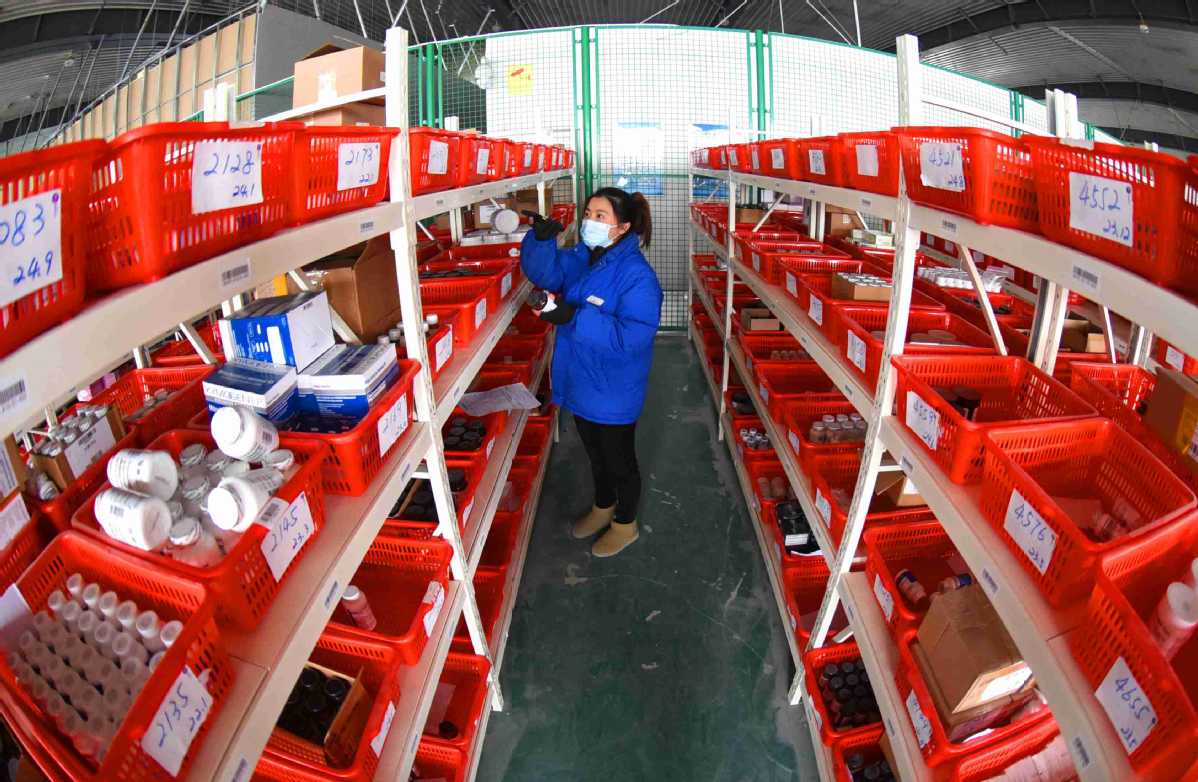Cross-border e-commerce injects stronger impetus into foreign trade

An employee arranges packages at a warehouse in a cross-border e-commerce industrial park in Lianyungang, Jiangsu province, in February. GENG YUHE/FOR CHINA DAILY
Cross-border e-commerce has played an increasingly important role in stabilizing China's foreign trade and provided a new way for micro, small and medium-sized enterprises and entrepreneurs to expand their footprint in overseas markets, experts said.
Cindy Tai, vice-president of Amazon and head of Amazon Global Selling Asia, said the country's accelerated efforts to push the digital transformation of traditional industries and small and medium-sized enterprises have brought confidence to the steady and high-quality development of China's foreign trade.
Tai underlined that China's imports and exports have played an important role in supporting economic growth, showing strong resilience amid external challenges and uncertainties.
This year's Government Work Report said the country has developed new forms of foreign trade, built 152 new integrated pilot zones for cross-border e-commerce, and supported the establishment of overseas warehouses in the past five years.
The latest data from Amazon showed that Chinese vendors sold billions of commodities to global consumers through the company's 18 overseas marketplaces last year. The number of Chinese sellers using Amazon's logistics services rose by more than 20 percent year-on-year and sales revenue achieved double-digit growth.
The number of Chinese brand owners on Amazon surged nearly three times in the past three years, with their turnover posting double-digit growth in 2022. Meanwhile, Chinese sellers have shown diversification trends in terms of merchandise categories and technological innovation as well as brand and business types.
Tai said Amazon will provide Chinese sellers with comprehensive and reliable logistics, inventory and supply chain solutions based on its global logistics capabilities and network advantages, to help them achieve long-term, sustainable growth and enhance global operational efficiency.
According to the General Administration of Customs, the import and export scale of the nation's cross-border e-commerce reached 2.11 trillion yuan ($304.9 billion) last year, a year-on-year rise of 9.8 percent. E-commerce exports stood at 1.55 trillion yuan, up by nearly 12 percent.
In November, approval was granted for the establishment of comprehensive pilot zones for cross-border e-commerce in a total of 33 cities and regions in the latest attempt to boost foreign trade growth. This is the seventh batch of such pilot areas, which now total 165 nationwide.
"It is the tenth time that cross-border e-commerce has been mentioned in the Government Work Report, indicating how important this sector is to China's foreign trade," said Diane Wang, founder, chairperson and CEO of DHgate Group, a Chinese cross-border business-to-business e-commerce platform.
Wang said the company has witnessed the boom of cross-border e-commerce in the past decade, enabling numerous small and medium-sized enterprises to set up online stores to digitalize their international trade businesses and enrich marketing channels to sell more through continuous innovation.
DHgate is doubling down on the fast-growing social commerce sector, which means a person's entire shopping experience from product discovery to check-out takes place on a social media platform.
It has launched MyyShop, a social commerce software-as-a-service business that connects Chinese supply chains with people who have substantial private domain traffic or influencers on social networking platforms worldwide.
It aims to help Chinese manufacturers, brands and micro, small and medium-sized enterprises access global private domain channels. It is designed to empower Gen Z consumers — those born between the mid-1990s and the early 2010s — and content creators, including online influencers, key opinion leaders and brand owners, Wang said.
It also helps MSMEs, especially entry-level merchants and individuals with social influence, to run their online stores as direct sellers.
"As a new form of foreign trade, cross-border e-commerce has witnessed rapid growth during the COVID-19 pandemic and become an important driving force for stabilizing China's foreign trade," said Zhang Zhouping, a senior analyst of business-to-business and cross-border activities at the Internet Economy Institute, a domestic consultancy.
It will have a profound impact on the transformation and upgrading of foreign trade in China, Zhang said, adding more and more Chinese enterprises have attached great importance to cross-border e-commerce as it plays an important part in bolstering traditional foreign trade enterprises to build new brands.
Photos
Related Stories
- China's int'l trade in services hits 459.5 bln yuan in January
- Global trade remains resilient despite Russia-Ukraine conflict: WTO
- Int'l trade with China soars in 2022, decoupling theory crushed by real flows
- China handles over 500 requests for trade expos abroad
- UK-China trading momentum to continue this year, say experts
- AU, UN agencies meet in Kenya to boost intra-Africa trade
- Zimbabwean trade agencies to host forum to boost trade ties with China
- China's commerce minister, Australia's trade minister to hold talks
- RCEP highlighted for promoting global trade
- China's Chongqing to further strengthen int'l land-sea trade corridor
Copyright © 2023 People's Daily Online. All Rights Reserved.









